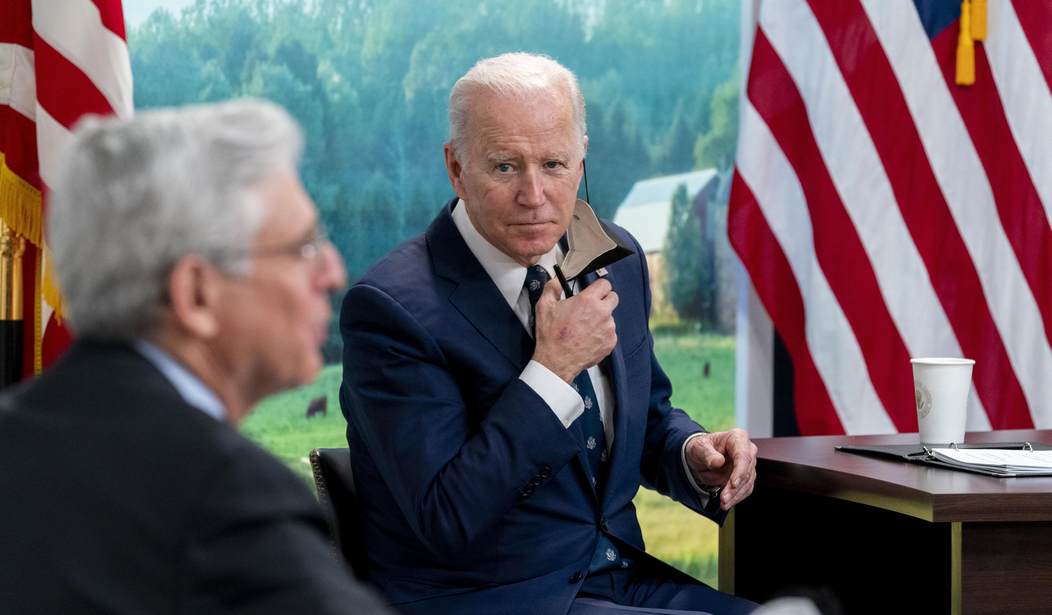Pardon me? Pardon Donald Trump for what, exactly?
Normally, one does not get a pardon without getting charged with a crime first. Pardons don’t usually get granted without a request, either. And since those requests usually come on the basis of remorse and admission of some guilt, the likelihood of such a request from Trump seems on par with the odds of him shaving a tonsure in his head and living out the rest of his life in a Benedictine monastery.
Washington Post columnist Jason Willick acknowledges these as rather large holes in his argument, but in his favor there is one historical exception, of course — the pardon of Richard Nixon by Gerald Ford. Nixon didn’t get formally charged with a crime, nor did he formally ask for the pardon, although some accused Nixon and Ford of arranging it ahead of Nixon’s resignation. In the event, Ford claimed that granted the pardon on the basis of what was best for the country at that time.
That’s the argument Willick makes to Biden now, too:
I’m not naive enough to think modern politicians are in the habit of sacrificing their own political interests to reduce polarization or strengthen “norms.” But it isn’t clear that pardoning Trump would hurt Biden politically. On the contrary, making such a startling move could put the weary president back in the center of the political universe, scramble political alignments and make his former rival — if he accepts the humbling offer — appear small and weak.
Put to one side the grave criminal scenarios in which Trump was using classified material for blackmail or some other sinister purpose, or secretly directing rioters to assault police at the Capitol on Jan. 6, 2021, and assume the indictment is based largely on what is already known. Biden would announce, after reviewing the charges in detail, that he has nothing but contempt for Trump and that he is offering a pardon precisely because he has no doubt about his (or another Democratic nominee’s) ability to rout the former president in an election, if it comes to that.
But Biden would express his concern, as the ultimate custodian of America’s national interest, about the precedent set by an election-year prosecution that rests in part on untested legal theories about obstruction or document classification by a sitting president. Trump’s acceptance of the pardon would enable Biden’s allies to make political hay of the (dubious) claim that this amounts to a recognition of guilt.
Needless to say, this assumes a lot of facts not yet in evidence. First off, there is no indictment, and at least so far no basis for one. Even the issue of mishandling classified information would run up against the way the Department of Justice handled the same matter — in arguably worse circumstances, with four years of unsecured transmission of that information — in 2016 with Hillary Clinton.
Willick seems to think that Trump would just blithely accept the pardon, too. Well maybe, but Trump certainly wouldn’t accept any inference that he committed a crime, and Trump would make clear the “dubious” nature of any claim otherwise. It’s the requesting of a pardon that confers a recognition of guilt, not the acceptance of an unsolicited pardon by someone who loudly proclaims his innocence the entire time.
If we want to discuss how things look, perhaps we should scrutinize Willick’s assessment of how this all redounds to Biden’s benefit. A pardon would, Willick writes, “put the weary president back in the center of the political universe.” Willick also supposes that it would negate a rising suspicion — and Trump’s claims — that the Department of Justice and FBI have become far too politicized and have mobilized against him:
One of Trump’s most potent appeals to Republican primary voters is the claim that Democrats want to suppress and criminalize their opposition, and that this requires an extraordinary electoral response from the GOP. A pardon would partially preempt this claim, while a grinding prosecution would produce unending news cycles that Trump could use to dominate a primary.
Would it, though? Consider this: what if Biden and Garland had this in mind all along? Garland could be giving Trump a full-court press and dedicating all of these resources to turn up the heat under Trump, all to push Trump into a position where he might be more inclined to “humble” himself into accepting a pardon that would marginalize Trump and demoralize his remaining supporters in the GOP.
Ten years ago, that kind of scenario would have only been believable in a John Grisham novel. (We could have called it The Beltway Pigeon Brief.) These days, though? Watching the unprecedented decision to raid a former president’s residence ostensibly over a months-long dispute over documents, and frog-marching Trump’s aides during arrests for contempt of Congress charges that the Department of Justice never enforced on people like Eric Holder, and that scenario suddenly doesn’t look quite as incredible.
If Biden then topped all that off with a pardon for crimes not yet charged — and especially for the same crimes the DoJ refused to consider on Hillary Clinton when Biden was Vice President — it would start looking a lot like a put-up job. It wouldn’t take a conspiracy theorist to unwind the same argument that Willick uses to profess the political benefit that Biden might accrue with such a move and then posit that Garland’s actions were calculated for that very purpose.
And even now, a pardon would be self-serving for both men now that the political backlash to the raid has damaged both the DoJ and the FBI. It would look like a desperate effort by Biden to bury this chapter of DoJ history by providing a best-spin effort to bring it to a sudden stop. And the conclusion that this would be a cover-your-ass choice for Biden and Garland doesn’t take a conspiracy theorist to figure out, either.







